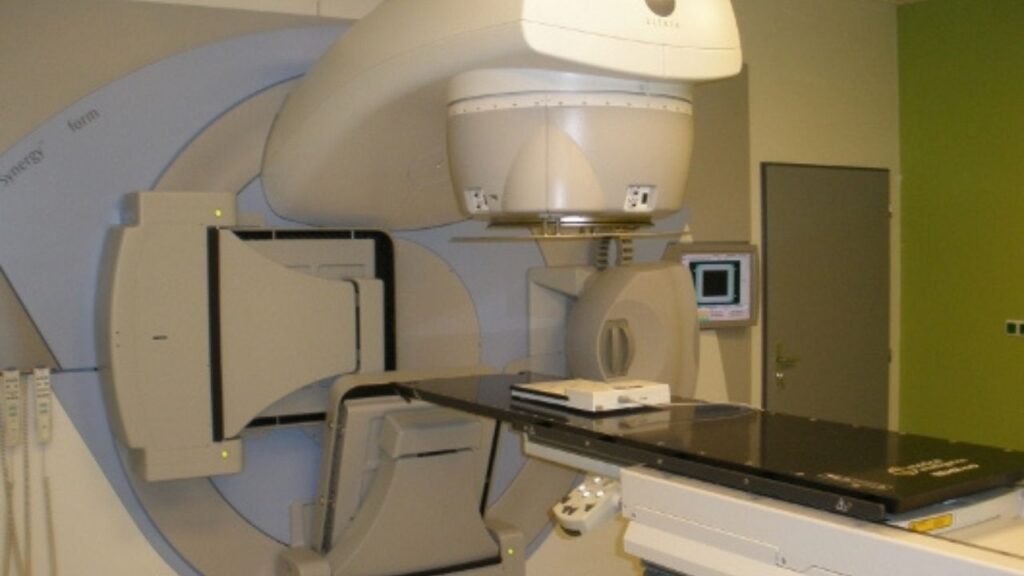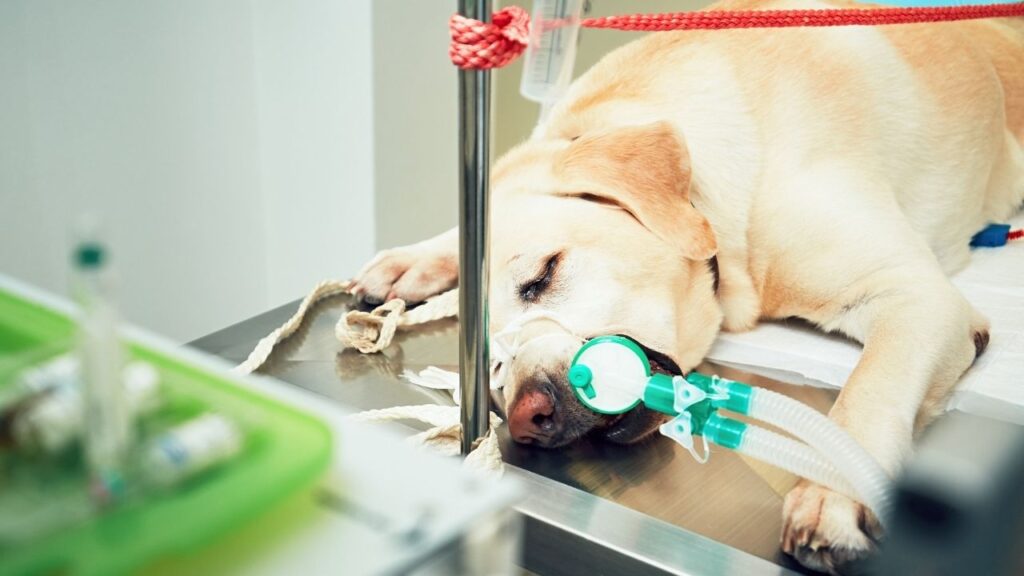Anti-cancer vaccines are tomorrow’s technology for today’s dog, offering a new approach to cancer therapy that activates and guides a pet’s own immune system to aggressively attack tumor cells. Since 2007, thousands of dogs have been treated with an innovative therapeutic DNA based dog melanoma vaccine from Merial, which has shown to be both safe for use in dogs and effective at increasing survival time.
Key Takeaways
- Oncept is the dog melanoma vaccine produced by Merial for canine oral melanoma.
- Dogs treated with the Oncept melanoma vaccine after local tumor control with surgery and/or radiation sometimes will have a longer survival rate and improved quality of life compared to dogs that do not receive the vaccine. Studies have shown a survival time of 12 months for dogs treated with the vaccine after local control of canine oral melanoma. Dogs who are treated with surgery alone will likely survive less than 6 months.
- The initial series of the Oncept melanoma vaccine is one vaccine every two weeks for four treatments, followed by a booster every 6 months.
- The oncept melanoma vaccine costs approximately $1,000-1,500 USD per dose, with a minimum of four initial doses, every two weeks and later one booster vaccine every six months. The cost estimate for six doses in the United States is $6,000-9,000 USD. Costs are variable depending on geographic location and availability.
- Oncept vaccine side effects last a short period of time and include fever, lethargy and swelling at the injection site.
This Vaccine Treats Melanoma
The Oncept® dog melanoma vaccine from Merial is available for use in dogs.2 We usually think of vaccines as preventing illness, but some vaccines are treatments. In this case, the Oncept vaccine was specifically developed to treat melanoma in dogs.
How the Oncept Vaccine Works
The Oncept vaccine targets certain enzymes that “mark” melanoma tumors. Let’s talk about melanin and melanoma, so we can explain.
Melanin, Melanocytes, and Melanoma
Melanin is a pigment produced by melanocyte cells. The cells are found in many parts of the body where there is pigment, particularly skin including the tissues of the mouth, ears and anus.
A melanoma is an abnormal production of melanocytes in an uncontrolled way that usually results in tumor formation. Melanoma is an aggressive tumor that produces the pigmentation enzyme tyrosinase, a key enzyme in melanin production.6
Tyrosinase
Melanoma tumors produce a lot of tyrosinase relative to normal melanocytes. That makes them good targets for a vaccine that teaches the dog’s immune system to target tyrosinase.2
Teaching the Immune System to Recognize the Enemy
The modern challenge to creating immune based therapies for melanoma and other cancers is to guide a highly specific immune response that identifies compounds on the tumor cell surface and activate immune factors that can regulate tumor growth.
The body’s immune system often does not recognize a tumor as a target for the immune system to attack and it grows uncontrollably as a result. But when targeted against the tumor, a host’s immune system can exert strong influences on tumor cell growth and activity.
The creators of Oncept have figured out a way to trick the dog’s immune system into recognizing the excess tyrosinase on melanoma tumors and destroy it (and therefore, help kill the tumor itself).
What Happens After Your Dog Is Vaccinated with Oncept
Once your dog receives the Oncept vaccine, several things happen to their immune system (and eventually, their cancer).
- Oncept uses a human gene for tyrosinase to code a DNA vaccine that is produced with canine DNA.4,5
- The human gene for tyrosinase is contained within a ring of DNA (plasmid).
- Human tyrosinase is different from canine tyrosinase so an immune response is generated, but enough alike that that the dog’s immune response is directed against the protein on the melanoma cancer cells.
- This stimulates the canine immune system to recognize the tumor as being foreign.
- The immune system targets the melanoma cells with foreign proteins.
- The immune system limits tumor cell proliferation and activity.6
And Then What Happens
The long-term effect is to mitigate (lower) the risk of tumor recurrence and metastasis of melanoma cancer cells. The vaccine is used after traditional therapies have been performed. Oncept helps with both quality of life and longevity for dogs with melanoma.
Cancers Commonly Treated with the Oncept Vaccine
Canine oral melanoma is one of the most commonly occurring type of melanoma tumor in dogs and has a poor prognosis for survival, typically less than six months. This is due to the highly active tumor cells that rapidly spread to other organs including the lungs, liver, kidney and lymph nodes.
Oral melanoma accounts for over 40% of all canine melanomas with older patients being more commonly affected.2 Melanomas occurring on dog’s digits are also common and account for 20% of all canine melanomas. Melanomas of other skin surfaces are less common, <10% of cases.
At this time, Oncept canine melanoma vaccine is USDA approved and exclusively indicated for canine oral malignant melanoma. It may also be effective at extending life after treatment for other melanomas.
- The functional characteristics of DNA vaccines suggests that the approach may be an effective treatment against other melanoma tumors that secrete tyrosinase.5
- Oncept and other DNA vaccines have been used in limited trials with safety and efficacy against melanoma tumors of the toes and skin.6
How the Oncept Vaccine Is Used with Other Treatments
The Oncept melanoma vaccine is a safe and effective adjunct therapy to surgery, radiation and to a lesser extent, chemotherapy for canine oral melanoma.3
Your veterinarian will likely recommend Oncept if your dog is eligible, because the vaccine extends survival times in dogs3 considered Stage II (tumors between 2-5 cm without lymph node involvement) or Stage III (spread to local lymph nodes and/or tumor larger than 5 cm).2
The vaccine is not a standalone treatment, and it doesn’t replace surgery, chemo, or radiation. Instead, it’s part of the treatment plan after the tumor has been controlled with traditional methods.2 Veterinary oncologists will use the vaccine to treat canine patients with Stage II or III oral melanoma as a safe and effective adjunct therapy.
Some studies show the Oncept vaccine extends survival times after the tumor has been controlled with traditional methods including surgical removal, radiation treatment and chemotherapy, while other studies show no improvement.4,8
For patients with stage IV disease progression (tumor of any size plus distant metastasis), Oncept might not extend survival times as well. Still, it can be used as a palliative treatment to help with life quality.
Dog Melanoma Vaccine for Dogs Survival Times
The expected survival time for dogs with Stage II, III or IV canine oral melanoma is less than 6 months if treated solely with surgery.5,6
Vaccination using the dog melanoma vaccine is effective at extending survival rates beyond 12 months, with some studies showing survival beyond 18 months.2,5
In a recent study in the UK, greater than 50% of canine patients treated with the melanoma vaccine had survival times greater than six months and more than 25% had survival times beyond 12 months.5
The Oncept melanoma vaccine is used clinically in an off-label application following the same treatment plan for immunization against melanomas that have been treated on the digits and other skin surfaces.2
- Malignant melanomas of the digit commonly metastasize.2,6
- Dogs with malignant melanoma of the digit that were treated with the canine melanoma vaccine had lower rates of metastasis and improved survival times.2,6
How the Vaccination Is Given
The vaccine is administered in the inner thigh muscle using a needle-free, pressure injection technique.2 Legs are alternated for injection. There is some noise associated with the pressure delivery system, but no needles.
Vaccination schedule includes four doses, one every two weeks.2 Dogs then receive a booster vaccination every six months.2 Each subsequent dose boosts the patient’s ongoing immune response against melanoma.2
How to Get the Best Results
There are no medical or nutritional interactions established. A veterinary specialist may recommend medications for fever and discomfort.
Remember, not all studies have demonstrated the same conclusive results and mixed results are found in the literature. Dogs appear to do best during melanoma treatment with a combination approach using multi-modal therapy, including the vaccine with surgery and radiation therapies. Tumor size, location and degree of invasiveness can all influence outcomes in vaccine effectives.
Home Care After Vaccination
There are no treatment specific restrictions following administration of the dog melanoma vaccine, and no known aftercare requirements. Transient side effects of fever, lethargy or swelling are not known to require treatment.2 A very small number of owners complain that the vaccine series may be associated with delayed and prolonged onset of lethargy.
Follow Up to the Dog Melanoma Vaccine
Standard post-cancer treatment medical surveillance should include tumor site monitoring for recurrence by a veterinary internist, oncologist or oral surgeon with expertise in treating melanoma. Routine bloodwork, chest x-rays and abdominal ultrasound to evaluate metastasis are recommended.
When to Not Use the Dog Melanoma Vaccine
Owners of dogs with melanoma and a compromised immune system should consult their veterinary specialist for any treatment specific concerns.
This is a vaccine that is used to extend survival time after diagnosis and during treatment for canine oral melanoma. The vaccine is not used routinely as a preventive measure.
Where to Get It
Oncept vaccine is USDA approved in the USA and available as part of a complete treatment plan through board certified veterinary oncologists.
Safety and Side Effects
A temporary, low-grade fever or redness and swelling at the injection site may be observed in some dogs.2 These side effects do not require any treatment and resolve quickly.
Post injection site bruising, hematoma and discomfort have been noted. Slight loss of pigment at injection site is noticed in heavily pigmented dogs.2
Dog Melanoma Vaccine Costs
Pets who suffer from the aggressive forms of melanoma may accumulate medical expenses beyond $10,000 when costs for diagnosis and treatment are considered.7 Owners should explore all available treatment options including the novel melanoma vaccine.
The high cost and poor prognosis for longevity are compelling factors in considering traditional and novel therapies for canine melanoma. The extension in length and quality of life from use of the DNA vaccine may be significant.
The vaccine itself costs approximately $1,000-1,500 USD per dose, with a minimum of four initial doses, every two weeks and later one booster vaccine every six months. The cost estimate for six doses in the United States is $6,000-9,000 USD.7 Costs are variable depending on geographic location and availability.
- Immunotherapy treatment. Cornell University College of Veterinary Medicine. https://www.vet.cornell.edu/departments-centers-and-institutes/riney-canine-health-center/health-info/immunotherapy-treatment#:~:text=What%20is%20immunotherapy%3F,be%20overtaken%20by%20cancer%20cells. Published July 28, 2022. Accessed February 1, 2023.
- Oncept Canine Melanoma Vaccine, DNA. Petcancervaccine.com. https://www.petcancervaccine.com/vaccine. Published 2017. Accessed February 1, 2023.
- Grosenbaugh, et al. Safety and efficacy of a xenogeneic DNA vaccine encoding for human tyrosinase as adjunctive treatment for oral malignant melanoma in dogs following surgical excision of the primary tumor. AJVR 2011;72: 1631-1638
- Bergman PJ, Camps-Palau MA, McKnight JA, et al. Development of a xenogeneic DNA vaccine program for canine malignant melanoma at the Animal Medical Center. Vaccine. 2006;24(21):4582-4585. doi:10.1016/j.vaccine.2005.08.027
- Verganti S, Berlato D, Blackwood L, et al. Use of oncept melanoma vaccine in 69 canine oral malignant melanomas in the UK. Journal of Small Animal Practice. 2017;58(1):10-16. doi:10.1111/jsap.12613
- Manley CA, Leibman NF, Wolchok JD, et al. Xenogeneic murine tyrosinase DNA vaccine for malignant melanoma of the digit of dogs. Journal of Veterinary Internal Medicine. 2010;25(1):94-99. doi:10.1111/j.1939-1676.2010.0627.x
- Khuly P. Melanoma. Embrace Pet Insurance. https://www.embracepetinsurance.com/health/melanoma. Published March 26, 2021. Accessed February 2, 2023.
- Ottnod JM, Smedley RC, Walshaw R, Hauptman JG, Kiupel M, Obradovich JE. A retrospective analysis of the efficacy of Oncept vaccine for the adjunct treatment of canine oral malignant melanoma. Veterinary and Comparative Oncology. September 2013.
ONCEPT® is a registered trademark of Merial
Topics
Did You Find This Helpful? Share It with Your Pack!
Use the buttons to share what you learned on social media, download a PDF, print this out, or email it to your veterinarian.






